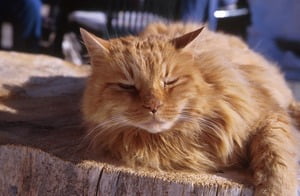I met her at an adoption fair at a local park. Animal rescue organizations from around the area had set up booths and the entire affair had the distinct feeling of a carnival with various barkers yelling for your attention and trying to convince you to lay your money down. It was hard to pick just one. I lived in a small apartment so I wanted a cat, but I was torn on weather or not to get a kitten. On one hand nothing is better then a kitten for playing with and watching explore the world. But kitten’s are in high demand and it is the older cats who often languish needlessly in shelters. I finally found one sweet little kitten with orange and white fur sitting all alone in a cage with a note that said she was special needs. I stared at her for a second. She was bright and alert with all her limbs and striking hazel eyes.
Excuse me,” I said to the volunteer, “Why is this cat special needs?”
“She has herpes,” the woman said in a whisper. It turns out that feline herpes is actually very common in kittens like this one who were born on the street. The virus is highly contagious and spreads swiftly from one cat to another which is why kittens are given a vaccine for it at an early age. But it was too late for this one, she was already infected. She couldn’t live in a household with other cats for fear of spreading the virus to them. But she could live with other animals like dogs and birds, since the virus can not be transmitted to them or to humans. It only passes from feline to feline.
The herpes virus lies dormant in the cat until it is triggered, sometimes by a stressful event or an immune system response. Then the infected cat will begin sneezing and have a runny nose and eyes. Often times a cat may get conjunctivitis where the soft tissue around the eyes swell up making the eye look swollen and discolored. In rare cases the cat may even lose the eye from the infection. Cats with herpes are also prone to other bacterial respiratory infections which can be deadly if let untreated. Adopting a cat with herpes is a big responsibility but one I was ready for. Besides, I thought, how bad could it be.
I got my answer a week later when the kitten, who I named Ginger, began sneezing. At first it was sort of cute but soon she her nose was so badly blocked that she had to breath out of her mouth. She stopped eating because she could no longer smell her food. I took her into the vet who said that it was one of those secondary infections that I had been warned about and we started an antibacterial treatment. He also suggested that I mix her dry food with some wet food that had been heated in the microwave to make it stinky enough to get through her stuffy nose. It worked, although my neighbors didn’t appreciate it. By the next weekend she was back to acting like a normal kitten, rampaging through the house and attacking me in my sleep. In fact it wasn’t until she was still that you even notice her eye which was so swollen that all you could see was the red tissue surrounding it.
This was the herpes. She also had developed some small herpes legions in her mouth. Because herpes is a virus it doesn’t respond to antibacterial treatments. In fact there is no treatment at all for feline herpes. The best they can do it try to manage it and protect the infected tissues until it works through. For Ginger this meant twice daily eye cleanings with a saline solution as well as an ointment to keep the eye moist and to try and keep her from getting any further infection. I also gave her a small amount of children’s Benadryl (about 1/5 of a teaspoon) to help clear the sinus passages and reduce swelling. Finally, the vet recommended that I give her Lysine tablets once a day. Lysine is a amino acid available in most health food stores that has been shown to help reduce the length of herpes outbreaks by interfering the the viral replication. Along with the medicine was plenty of TLC. I took Ginger into the bathroom with me when I’d shower so that the steam could help with her congestion. I also got up a half hour early each day to have time to play with her and pet her before I went to work. Ten days later she was back to normal and nobody could tell by looking at her that she was different from any other animal. I continue her on a smaller dose of the lysine to try and prevent another outbreak. I also try and keep her life as stress free as possible. Cats get agitated over changes in their routines, their food and their litter boxes. So I do my best to keep Ginger on a regular schedule for playtime and feedings. I also make sure she has a litter box in each room and food and water available throughout the house so that she never has to worry about those things.
If the idea of caring for a cat with herpes makes you scared then you may want to adopt an older cat with a well documented medical history. Unless a cat is in the middle of an outbreak it is impossible to tell if they have it or not and even the youngest kittens can be unknowingly infected especially if there mother was. Luckily most shelters know about the disease and offer to let you exchange the animal if it comes down with the virus. But I urge you not to do that unless you have other non-infected cats in the home. If you can open your heart to a cat with feline herpes you will really be rewarded, These cats are just as cute, loving and active as other cats and the herpes virus does not shorten their lifespans or overall health. I have gotten so much fulfillment from knowing that by adopting Ginger I didn’t just get a pet, I really helped to save her life. And I think that she knows it. When she first came home she slept in her own bed but ever since the first outbreak she refuses to sleep anywhere away from me. She knows how much work I put into caring for her, and I know that she is worth it.


